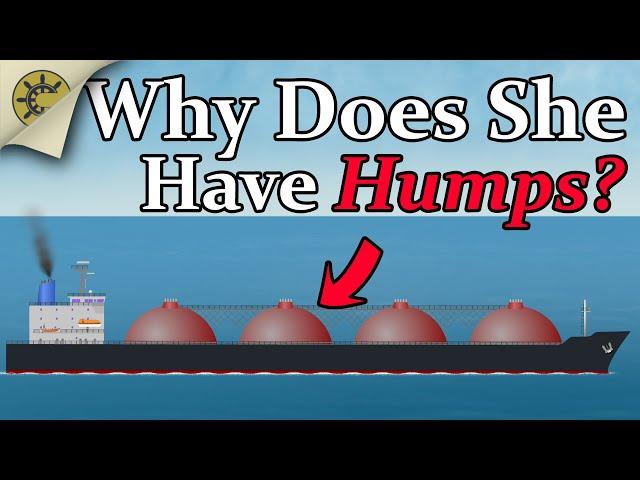
Why Do Gas Carriers Have These Humps?
Комментарии:

“Bro, wake up, Casual Navigation uploaded a video!”
Ответить
Wow, wasn’t expecting such a heavy chemistry lesson. 😂
Ответить
the reason for the spherical tanks is about stress in the stainless steel at super cold temps . with the way ships roll in the waves the way the tanks are suspended in the ship is critical to preventing them cracking apart. this is for LNG and the spherical design turned out to be the most successful. it's not about high pressure.
Ответить
people who use propane in cold climates end up having to heat their tanks of propane or it stops evaporating to a gas and becomes unusable. some even literally put firewood around the big tanks and make a fire
Ответить
Boat honkers lol
Ответить
Great video, I'll be keeping an eye out for gas carriers in Montana!
Ответить
You didn't answer why spheres are more pressure resistant
Ответить
Hmmmm utters
Ответить
Pentane is a liquid under normal atmospheric conditions, its boiling point is 36 °C.
Ответить
Tldr
To hold more gas

Quad boob tanker
Ответить
PV = nRT
P = Pressure (Pa)
V = Volume (m³)
n = mol of gas
R = ideal gas constant (8.3145 J/(mol•K))
T = Temperature (K)

Why is the temperature the function of volume? I have hard time understanding that graph around 2 min. Looks like no volume exists until a cetain temperature, then the volume changes arbitrarily at a single temperature, then as the temperature starts to increase, the volume starts to increase as well. Strange.
Ответить
Wake up casual navigation posted
Ответить
Any idea what they do with the space between the spheres below deck? Are they just left empty? Do they fit refrigeration machinery in there?
Ответить
The same theroys are actually used to separate the gases apart in the when you refine the gas that comes out of the ground.
Ответить
the boob ships
Ответить
Um maybe to carry the gas😂
Ответить
Because they're carrying gas.
God damnit what a stupid premise for a video.

It would be really cool if they were observatories (pay no attention to the problem of stabilizing large telescopes on a pitching deck). But no, they’re meant to haul hydrocarbons around to help raise sea levels so ships have even more places they can go.
Ответить
These are silicone carriers
Ответить
I don’t see humps? I see spheres.
Ответить
Those humps are the smoking areas for the crew.
Ответить
Otherwise known as the camels of the ocean.
Ответить
I love his voice it's so fitting to narration.... never get tired of it
Ответить
Boobs!
Ответить
meethane
Ответить
From butane onwards, they are rarely transported in gas carrier ships. Butane's boiling point is -1C. That is very easy to do in bulk, and rectangular tanks, instead of spherical tanks.
Ответить
she?
Ответить
What a good video. The whistling baclground music during the Exampleane example was annoying, though. I would recommend avoiding repetitions of penetrant sound bites in the future, the video's content suffers under it.
Excellent balance between simplicity and accuracy in your illustrations and explanations. Well done.

I love that Casual Navigation routinely teaches me stuff I didn't realize I wanted to know!
Ответить
really solid explanation about boiling and condensing with relation to pressure and temperature 👌
Ответить
I just love that the section about cigarette lighters came up as I was lighting a cigarette with a lighter like the one on the right 😂
Ответить
Doesn't everyone know sphere's hold pressure back best? I thought it was common knowledge?
Ответить
I was told the spherical tanks were to reduce the free surface effect from hauling a tank full of liquid in an unbaffled tank. Its also why they only sail with the tanks full or virtually empty.
Ответить
I remember one New Years Eve when it was -25°C (or maybe a little colder, I don't remember) and quite windy, so at midnight we all went outside to watch the fireworks, but in about 2 minutes we decided it was too painful and returned inside; all except the couple of guys who were crazy enough to stay outside and set of the fireworks. But apparently it was too cold for them to be able to keep the butane lighters above -0.5°C so they had to run inside between each fuse to "thaw" their hands and lighters to keep the lighters from sputtering liquid butane (and it was too windy for Zippos and matches to work). It would even keep sputtering liquids indoors for several minutes.
I think they spent more than 1 hour setting off a rather moderate amount of fireworks. It's quite impressive that none of them developed (too severe) frost bites; but I guess being forced inside to warm their hands all the time helped.

Gas is stored in the balls
Ответить
a clarification, the critical temperature/pressure is the point at which it stops being a liquid or a gas, containing it at that temperature is still very much possible and will work the same as if it were a liquid barring a few specific exceptions relevant to safety systems inherent to potential leaks and the materials used to contain them, but theyre still every bit as dense as the liquid form, or close enough at least for transportation purposes, said specific exceptions relevant to transporting any specific supercritical fluid might render it more economically viable to cool it down so it does stay a liquid but its still possible to transport in much the same way.
Ответить
I’m pretty sure most people expected a generic video on a cool fact about ships, and it ended up turning into a physics lesson lol.
Ответить
To bring all the boys to the shipyard
Ответить
50 bar? So if something were to pierce those spheres the resulting jet would be incredibly high speed.
Ответить
better question: why does not one call them camelships?
Ответить
I imagine there's some extra complexity for managing slosh/free surface effect while also leaving enough head room for some gas? E.g. I assume you'd never run with the tanks half full of liquid.
Ответить
And all this time I thought these types of ships were specialized to transport large numbers of brassieres.
🤣

This video is a massive chemistry lesson hidden behind a simple question.
TL;DR - The simple answer is Gas is stored at very high pressure, and a sphere is the most efficient way to disperse that pressure evenly so that the container doesn't rupture. The 'humps' are just a part of the larger spheres hidden under the deck.

My hump, my hump, my hump (hump), my lovely carrier lumps.
Ответить
That was a very welcome primer.
Amazing how different those hydrocarbons behave with pressure and temperature changes.


























